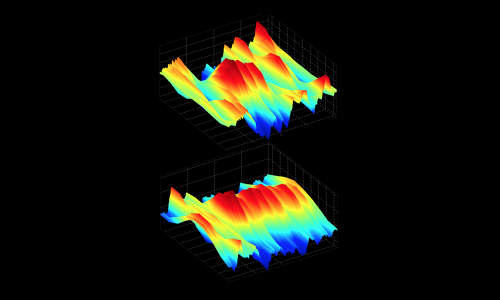University of Oregon researchers have tapped the rhythm of memories as they occur in near real time in the human brain.
Early transient peaks (top) and later sustained peaks (bottom) correspond to distinct stimulus-specific patterns of neural activity observed during stimulus encoding and storage, respectively. Photo Credits: Courtesy of Edward Awh
Using electroencephalogram (EEG) electrodes attached to the scalps of 25 student subjects, a UO team led by psychology doctoral student David E. Anderson captured synchronized neural activity while they held a held a simple oriented bar located within a circle in short-term memory. The team, by monitoring these alpha rhythms, was able to decode the precise angle of the bar the subjects were locking onto and use that brain activity to predict which individuals could store memories with the highest quality or precision.
The findings are detailed in the May 28 issue of the Journal of Neuroscience. A colour image illustrating how the item in memory was tracked by rhythmic brain activity in the alpha frequency band (8 to 12 beats per second) is on the journal’s cover page to showcase the research.
Although past research has decoded thoughts via brain activity, standard approaches are expensive and limited in their ability to track fast-moving mental representations, said Edward Awh, a professor in the UO’s Department of Psychology and Institute of Neuroscience. The new findings show that EEG measures of synchronized neural activity can precisely track the contents of memory at almost the speed of thought, he said.
“These findings provide strong evidence that these electrical oscillations in the alpha frequency band play a key role in a person’s ability to store a limited number of items in working memory,” Awh said. “By identifying particular rhythms that are important to memory, we’re getting closer to understanding the low-level building blocks of this really limited cognitive ability. If this rhythm is what allows people to hold things in mind, then understanding how that rhythm is generated — and what restricts the number of things that can be represented — may provide insights into the basic capacity limits of the mind.”
The findings emerged from a basic research project led by Awh and co-author Edward K. Vogel — funded by the National Institutes of Health — that seeks to understand the limits of storing information. “It turns out that it’s quite restricted,” Awh said. “People can only think about a couple of things at a time, and they miss things that would seem to be extremely obvious and memorable if that limited set of resources is diverted elsewhere.”
Past work, mainly using functional magnetic resonance imaging (fMRI), has established that brain activity can track the content of memory. EEG, however, provides a much less expensive approach and can track mental activity with much a higher temporal resolution of about one-tenth of a second compared to about five seconds with fMRI.
“With EEG we get a fine-grained measure of the precise contents of memory, while benefitting from the superior temporal resolution of electrophysiological measures,” Awh said. “This EEG approach is a powerful new tool for tracking and decoding mental representations with high temporal resolution. It should provide us with new insights into how rhythmic brain activity supports core memory processes.”
Story Source:
The above story is based on materials provided by Helmholtz Centre for Infection Research.





